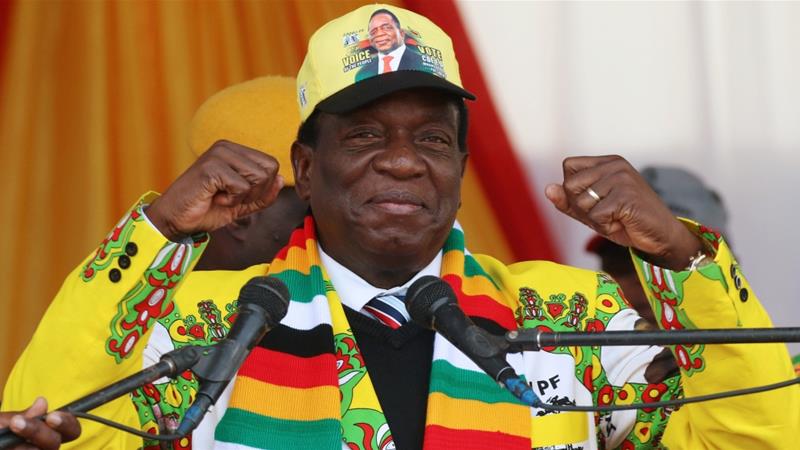REPORT WITH US
WhatsApp: +263 7 18636459
Email: editor@thecitizenbulletin.com
Twitter: @TheCB_News
Facebook: The Citizen Bulletin
“More Local, More Inclusive, More Interactive"

Central government's pledges to rehabilitate local hospitals such as Manama (pictured) have remained largely unfulfill...
Continue Reading...

Mnangagwa's leadership in dealing with COVID-19 is constantly being juxtaposed with his counterpart next-door, Cyril Ramaphosa, South Africa's president
by The Citizen Bulletin Reporters
BULAWAYO, April 6. 2020 (The Citizen Bulletin)— Acting under intense pressure induced by the clearcut decisiveness of South Africa’s president Cyril Ramaphosa in the fight against the coronavirus, on March 27, Emmerson Mnangagwa, Zimbabwe’s president, abruptly announced that his country was, like its neighbor in the south, going on 21-day national lockdown, promising a raft of measures which he said were going to be implemented in a “few days”.
Among his promises, Mnangagwa said his government-led coronavirus task force would decentralize testing and treatment of COVID-19, the disease caused by the virus. He also promised to equip health centres outside the capital, Harare to ensure that the country was ready to halt the spread of the deadly pathogen.
But exactly a week after the lockdown came into effect, Mnangagwa’s administration is still grappling to set up testing and treating centres across the country. Luckily, as of Sunday, April 6, the country still had only 9 confirmed COVID-19 cases and one death. To make matters worse, on Saturday, April 5, July Moyo one of the members of the coronavirus taskforce told members of the press in Bulawayo that should anyone in the city and the rest of the southern region be ill, they will have to be transferred to Harare for treatment.
Earlier on, the same minister had presided over the official opening of Joshua Mqabuko Nkomo Ekusileni Hospital now a COVID-19 isolation and treatment centre before it turned out the hospital which should otherwise have been well equipped, is just a shell with no equipment. Bulawayo’s Thorngrove Infectious Diseases Hospital on the other hand, it has emerged, is still woefully under-equipped and not ready for the isolation and treatment of COVID-19 patients.
The hospital will probably be ready to host COVID-19 patients after a week, and it will only be able to accommodate less than 50 patients, unless it gets a facelift of US$300 000 which authorities are failing to raise, begging the business and nonprofit sector to chip in with donations.
“I think they will have to go to Harare,” Moyo said in a video posted by CITE. “Depending on the intensity...they will have to go to Wilkins.”
Ironically, during his typically half an hour daily coronavirus updates aired by the country’s sole state-broadcaster, Mnangagwa has been assuring the nation that his government efforts to tame the pandemic are all but well coordinated, yet reports on the ground show that the slow-pace approach by the central government could cost the country if the deadly virus strikes more areas outside Harare.
“We urgently need to set up the centers for testing and start extensive tests throughout the province and test as many people as possible, Bekezela Maduma Fuzwayo, spokesperson of the Gwanda Residents Association which has been helping sensitize residents about COVID-19 said.
“We are really trailing behind in terms of preparedness for the Coronavirus.”
Meanwhile, the remaining 14 days could become unbearable for many vulnerable communities who went into the quarantine without food.
“The lockdown comes at a time when most rural households are struggling with the effects of the drought,” Habakkuk Trust said in a statement over the weekend.
“The government should, therefore, ensure that in the midst of the fight against COVID-19, vulnerable communities are provided with food and basic commodities to avoid loss of life due to hunger.”
According to government authorities, the Department of Social Welfare is set to start food distribution beginning today. However, in the past, government-led aid programs have been politicised by members of the ruling elite, making it difficult for the most vulnerable to benefit.
Norman Mpofu, a former legislator for Bulilima East, said Covid-19, particularly the total lockdown, has seen many families who survive on diaspora remittances go on empty stomachs.
“With this cumulative drought effect of last year and this year the province is extremely exposed to Covid-19. The unavailability of water in the province further compromises hygiene standards,” Mpofu noted.
“Worse still the people of this region depend on neighbouring countries, that is Botswana and South Africa for almost everything including information. They are more concerned about the lockdown in South Africa than the one in Zimbabwe.
“The one in South Africa and Botswana affects them directly as there are no deliveries of basics by omalayitsha.”
This website uses cookies that are necessary to its functioning and required to achieve the purposes illustrated in the privacy policy. By accepting this OR scrolling this page OR continuing to browse, you agree to our privacy policy.